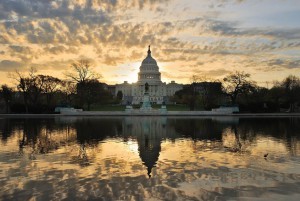On the Hill: Anti-Blasphemy Law Resolution Introduced in Senate

Last week, Senators James Lankford (R-OK) and Chris Coons (D-DE) worked with the American Humanist Association to introduce a resolution opposing blasphemy laws around the world. This resolution follows the AHA’s work last year, when Reps. Jamie Raskin (D-MD), Alex Mooney (R-WV), David Cicilline (D-RI), and John Culberson (R-TX) introduced a similar resolution in the House. These resolutions have the support of a coalition of twenty religious and nontheistic advocacy organizations, including Christian Solidarity Worldwide, the Hindu American Foundation, the Union for Reform Judaism, the World Muslim Conference, and the American Humanist Association.
These resolutions are proof that, even in today’s hyper-partisan gridlocked Congress, bi-partisan, interfaith work is still possible.
Blasphemy laws are the most explicit laws banning the expression of doubts or criticism with regard to religion, and various countries utilize them to ban criticism of religious beliefs, symbols, and figures. Blasphemy laws harm not just the nontheistic and those without a religious affiliation, but dissidents in all religious sects. In many countries, Christians, Jews, Muslims, Hindus, and other religious minorities are imprisoned, tortured, sentenced to death, and executed for blasphemy offenses. According to the Pew Research Center, over a quarter of the world’s countries maintain blasphemy laws.
The resolutions themselves do some pretty important things:
- Call on the president and the Department of State to: (1) make the repeal of blasphemy, heresy, or apostasy laws a priority in the bilateral relationships of the United States with all countries that have such laws; and (2) designate countries that enforce such laws as “countries of particular concern for religious freedom” under the International Religious Freedom Act of 1998.
- Urge the governments of countries that: (1) enforce such laws to amend or repeal such laws; and (2) have prosecuted, imprisoned, and persecuted people on charges of blasphemy, heresy, or apostasy to release such people unconditionally and ensure their safety.
- Encourage the president and the State Department to oppose: (1) any efforts by international or multilateral fora to create an international anti-blasphemy norm, and (2) any attempts to expand the international norm on incitement to include blasphemy or defamation of religions.
The language regarding “countries of particular concern” is especially important, as nations that find themselves on that list may be subject to sanctions and other economic and diplomatic consequences.
It’s reassuring that while American politicians are so divided on so many issues, there remains some common ground on which progress can be made. And progress is urgently required here, as the ongoing murders and arrests as a result of blasphemy laws, including the recent murder of American atheist Dr. Avijit Roy, must be taken seriously and stopped.
